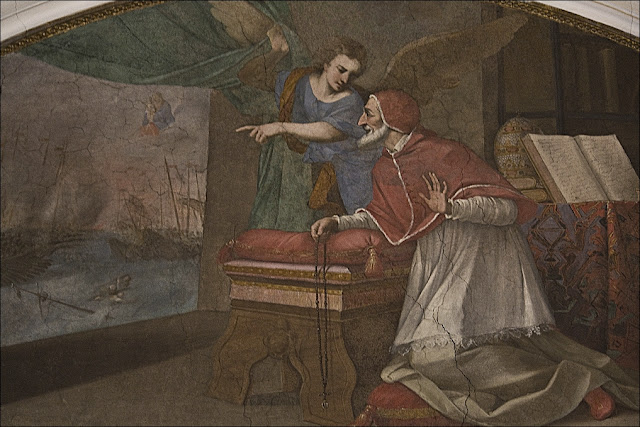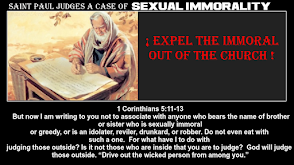The feast of the Rosary was instituted by Saint Pius V in memory of the victory of Lepanto over the Turks.

THE LITURGICAL YEAR – Dom Prospero Gueranger, Abbot of Solesmes
HISTORY OF THE FEAST — The feast of the Rosary was instituted by Saint Pius V in memory of the victory of Lepanto over the Turks. It is already known that, in the sixteenth century, the disciples of Mahomet, after seizing Constantinople, Belgrade and Rhodes, seriously endangered all of Christendom. Pope Saint Pius V, an ally of the King of Spain Philip II and the Republic of Venice, declared war on them. Don Juan of Austria, who was in command of the fleet, received orders to join battle as soon as possible and, therefore, knowing that the Turkish fleet was in the Gulf of Lepanto, he went there to attack it. The meeting took place on October 7, 1571, near the islands of Corfu (Equinadas). At that moment, all over the world the brotherhoods of the Rosary prayed with confidence. D. Juan's soldiers got down on their knees to implore heaven's help and, although they were much less, they began the fight. After a terrible fight of four hours, out of three hundred enemy ships, only forty were able to flee; The rest were sunk and 40,000 Turks died. Europe had been saved.

The Blessed Virgin Mary gave the Holy Rosary to Saint Dominic de Guzmán as a weapon to combat heresy and convert sinners.
Feast of the Holy Rosary
from the Liturgical Year, 1903
It is customary with men of the world to balance their accounts at the end of the year, and ascertain their profits. The Church is now preparing to do the same. We shall soon see her solemnly numbering her elect, taking an inventory of their holy relics, visiting the tombs of those who sleep in the Lord, and counting the sanctuaries, both old and new, that have been consecrated to her divine Spouse. But today's reckoning is a more solemn one, the profits more considerable: she opens her balance-sheet with the gain accruing to our Lady from the mysteries which compose the Cycle. Christmas, the Cross, the triumph of Jesus, these produce the holiness of us all; but before and above all, the holiness of Mary. The diadem which the Church thus offers first to the august Sovereign of the world, is rightly composed of the triple crown of these sanctifying mysteries, the causes of her joy, of her sorrow, and of her glory. The joyful mysteries recall the Annunciation, the Visitation, the Birth of Jesus, Mary's Purification, and the Finding of our Lord in the Temple. The sorrowful mysteries bring before us the Agony of our Blessed Lord, His being scourged, and crowned with thorns, the carrying of the Cross, and the Crucifixion. While, in the glorious mysteries, we contemplate the Resurrection and Ascension of our Savior, Pentecost, and the Assumption and Coronation of the Mother of God. Such is Mary's Rosary; a new and fruitful vine, which began to blossom at Gabriel's salutation, and whose fragrant garlands form a link between earth and heaven.
In its present form, the Rosary was made known to the world by St. Dominic at the time of the struggles with the Albigensians, that social war of such ill-omen for the Church. The Rosary was then of more avail than armed forces against the power of Satan; it is now the Church's last resource. It would seem that, the ancient forms of social prayer being no longer relished by the people, the Holy Spirit has willed by this easy and ready summary of the Liturgy to maintain, in the isolated devotion of these unhappy times, the essential of that life of prayer, faith, and Christian virtue, which the public celebration of the Divine Office formerly kept up among the nations. Before the thirteenth century, popular piety was already familiar with what was called the psalter of the laity, that is, the Angelical Salutation repeated one hundred and fifty times; it was the distribution of these Hail Marys into decades, each devoted to the consideration of a particular mystery, that constituted the Rosary. Such was the divine expedient, simple as the Eternal Wisdom that conceived it, and far-reaching in its effects; for while it led wandering man to the Queen of mercy, it obviated ignorance which is the food of heresy, and taught him to find once more "the paths consecrated by the Blood of the Man-God, and by the tears of his Mother."
Thus speaks the great Pontiff who, in the universal sorrow of these days, has again pointed out the means of salvation more than once experienced by our fathers. Leo XIII., in his Encyclicals, has consecrated the present month to this devotion so dear to heaven; he has honored our Lady in her Litanies with a new title, Queen of the most holy Rosary; and he has given the final development to the solemnity of this day, by raising it to the rank of a second class Feast, and by enriching it with a proper Office explaining its permanent object. Besides all this, the Feast is a memorial of glorious victories, which do honor to the Christian name. Soliman II., the greatest of the Sultans, taking advantage of the confusion caused in the West by Luther, had filled the sixteenth century with terror by his exploits. He left to his son, Selim II., the prospect of being able at length to carry out the ambition of his race: to subjugate Rome and Vienna, the Pope and the Emperor, to the power of the Crescent. The Turkish fleet had already mastered the greater part of the Mediterranean, and was threatening Italy, when, on the 7th October, 1571, it came into action, in the Gulf of Lepanto, with the pontifical galleys supported by the fleets of Spain and Venice. It was Sunday; throughout the world the confraternities of the Rosary were engaged in their work of intercession. Supernaturally enlightened, St. Pius V. watched from the Vatican the battle undertaken by the leader he had chosen, Don John of Austria, against the three hundred vessels of Islam. The illustrious Pontiff, whose life's work was now completed, did not survive to celebrate the anniversary of the triumph; but he perpetuated the memory of it by an annual commemoration of our Lady of Victory. His successor, Gregory XIII, altered this title to our Lady of the Rosary, and appointed the first Sunday of October for the new which possessed an altar under that invocation. A century and a half later, this limited concession celebration in those churches ,was made general. As Innocent XI. in memory of the deliverance of Vienna by Sobieski, had extended the Feast of the most holy Name of Mary to the whole Church; so, in 1716, Clement XI. inscribed the Feast of the Rosary on the universal Calendar, in gratitude for the victory gained by Prince Eugene at Peterwardein, on the 5th August, under the auspices of Our Lady of the Snow. This victory was followed by the raising of the siege of Corfu, and completed a year later by the taking of Belgrade.

In the Treatise on True Devotion to the Blessed Virgin, St. Louis de Montfort teaches us that the Virgin Mary will lead us in the fight against Satan, to battle against the army of the Antichrist; formed by heretics, apostates, wicked, idolaters and Mohammedans. Saint Louis adds that in these latter times, the Blessed Virgin will raise up great saints, who will extend the empire of Jesus Christ over "the impious, the idolaters and the Muslims."
Prayer:
Our Lady's mysteries are before all time in God's sight, like those of her divine Son ; like these they will endure for all eternity; like them they rule the ages, which circle round the Word and Mary, preparing for both in the days of figures, perpetuating their presence by the incessant glorification of the most holy Trinity, in whose name all Christians are baptized. Now the Rosary honors all this series of mysteries ; today's Feast is a glance back upon the Cycle as it draws to its close. From these mysteries, from this view of them, we must draw the conclusion formulated by our Lady herself in this passage from Proverbs, which the Church applies to her: "Now therefore, my children, consider my ways ; imitate me, that you may find happiness." Blessed is he that watcheth at her gate! Let us pray to her, rosary in hand, considering her at the same time, meditating on her life and her greatness, and watching, were it but for a quarter of an hour, at the entrance to the palace of this incomparable Queen. The more faithful we are, the more assured will be our salvation and our progress in true life.























